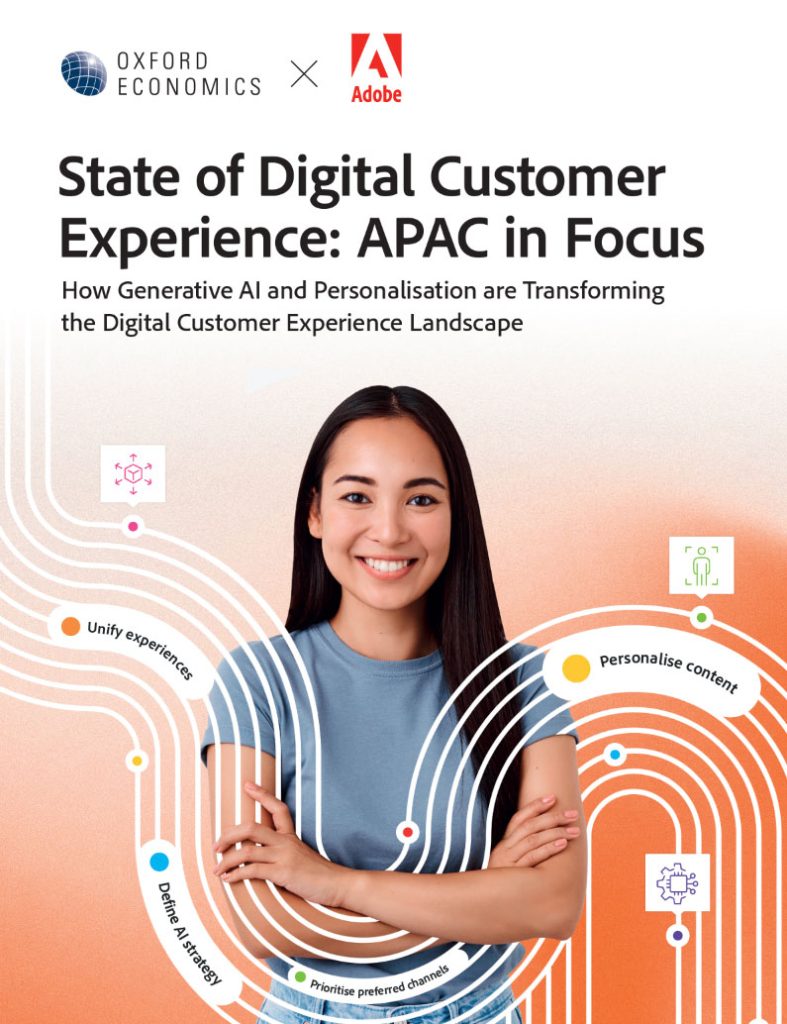SINGAPORE — Despite almost half of consumers in Singapore (42%) favoring artificial intelligence (AI)-assisted brand interactions, a new report shows brands in Singapore are trailing the world in harnessing the latest AI innovations.
According to Adobe‘s “State of Digital Customer Experience” report, almost half of consumers in Singapore (42%) would choose an AI-enabled tool or service over a human interaction, more than the global average of 40%. Many more want both options to be available, particularly when exploring new products and services.

Despite these preferences and consumers in Singapore anticipating customer experience (CX) benefits from generative AI, brands are falling behind global peers. Only 12% leverage generative AI to enhance CX initiatives compared to 17% globally. Brands globally (20%) are also more than three times more likely than brands in Singapore (6%) to have already briefed senior leadership on organizational implications. Interestingly, 16% of brands in Singapore are currently establishing upskilling initiatives to work with generative AI, compared to just 11% globally.
However, brands in Singapore are committed to improving their generative AI capabilities in the next 12 months, with half saying it is their primary CX focus. That puts it second on the strategic agenda, with a similar proportion as integrating the CX technology stack (52%), and ahead of applying data insights into CX efforts (42%) as well as investing in new technologies that touch or impact the CX (33%).
“Consumers are swiftly embracing generative AI-led experiences. While brands in Singapore are lagging behind in terms of AI adoption, our findings indicate that this will soon evolve as Singapore, as well as other Asia markets, are well poised for an accelerated uptake amid continued realization of the direct benefits that generative AI offers and its strong position as a technological hub. Regarding business strategies, most brands in Singapore acknowledge that improving the Customer Experience is of top or significant priority. This is driving brands to focus on evolving their digital experiences, underscored by a strategic emphasis on flexible and highly personalized interactions,” said Simon Dale, Vice President for Asia at Adobe.
Consumers in Singapore more data-conscious in the generative AI era
More than two-thirds of consumers in Singapore (68%) want brands to offer the same level of personalization online and in-person, and 3 in 4 want unified, seamless experiences in every interaction. However, meeting this expectation remains a top challenge for brands.
Most are yet to adopt the data-driven technology tools and capabilities needed to deliver personalization at scale and keep pace with customer preferences.
Consumers and brands agree that data privacy and security concerns constrain personalization. 24% of brands in Singapore say consumer reluctance to share data is a top barrier, but they underestimate the impact of data missteps. 77% of consumers in Singapore will stop or consider not buying from brands that lack transparency over personal data use, compared to just 60% globally. Yet, only 40% of brands believe it impacts retention.
Consumer attention to data practices extends to generative AI. Consumers in Singapore are worried that as brands use generative AI, their personal data will be used without consent (61%) and that too much data will be collected (64%). This is compared to 56% and 55% of global consumers, respectively.
Across Singapore, many brands are yet to respond to the need for stronger AI guardians to meet consumer expectations and ensure trust is not compromised. Just 14% of brands in Singapore have ongoing or completed initiatives to create internal usage policies.
“Consumers have emphasized that their most impactful brand experiences are relevant and personalized to their preferences. As brands continue to digitalize at full speed to meet expectations, it is crucial that they also strategically navigate data privacy and security concerns so as not to jeopardize their relationship with customers,” concluded Simon.








